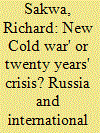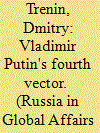| Srl | Item |
| 1 |
ID:
081387


|
|
|
|
|
| Publication |
2008.
|
| Summary/Abstract |
President Vladimir Putin's foreign policy can be characterized as a 'new realism', repudiating some of the exaggerated ambitions of Yevgeny Primakov's tenure as foreign minister in the late 1990s while asserting Russia's distinctive identity in world politics. Rather than acting as a classic 'balancing' power prescribed by classic realist theory as the response to the hegemonic power of a single state, Russia under Putin tended to 'bandwagon' and the country has been a vigorous 'joiner'. Putin insisted that Russia retains its 'autonomy' in international politics while moving away from earlier ideas that Russia could constitute the kernel of an alternative power bloc. However, the opportunity to integrate Russia into the hegemonic international order may have been missed because of what is seen in Moscow as the resolute hostility of groups in the West who continue to pursue Cold War aims of isolating and containing Russia. The Cold War was transcended in an asymmetrical manner, and this has given rise to four major failures: political, strategic, intellectual and cultural. The world faces the danger of the onset of a new era of great power bloc politics, thus restoring a Cold War structure to the international system. With none of the major strategic issues facing the international community at the end of the Cold War yet resolved, we may be facing a new twenty years' crisis.
|
|
|
|
|
|
|
|
|
|
|
|
|
|
|
|
| 2 |
ID:
144605


|
|
|
|
|
| Summary/Abstract |
In February, Moscow and Washington issued a joint statement announcing the terms of a “cessation of hostilities” in Syria [1]—a truce agreed to by major world powers, regional players, and most of the participants in the Syrian civil war [2]. Given the fierce mutual recriminations that have become typical of U.S.-Russian relations [3] in recent years, the tone of the statement suggested a surprising degree of common cause. “The United States of America and the Russian Federation . . . [are] seeking to achieve a peaceful settlement of the Syrian crisis with full respect for the fundamental role of the United Nations,” the statement began. It went on to declare that the two countries are “fully determined to provide their strongest support to end the Syrian conflict.”
|
|
|
|
|
|
|
|
|
|
|
|
|
|
|
|
| 3 |
ID:
122364


|
|
|
|
|
| Publication |
2013.
|
| Summary/Abstract |
Tendencies will continue - a geopolitical shift towards Eurasia and the Asia Pacific Region; symbolic 'sovereignization' of Russia and its further distancing from the U.S. and Europe; and the erosion of a foreign policy consensus. The fourth edition of Putin's foreign policy will most likely differ significantly from the previous three.
|
|
|
|
|
|
|
|
|
|
|
|
|
|
|
|